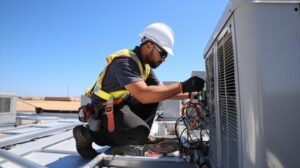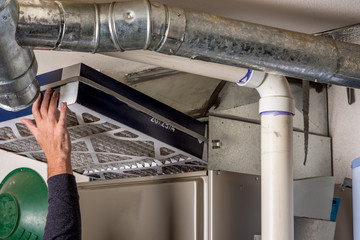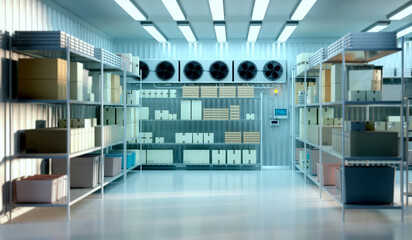Why HVAC Services Prioritize Safety
Regular HVAC service with a reputable company is the best way to increase your system’s lifespan and maintain efficiency. It can also save you money in the long run.
Whether they’re working with heavy equipment, chemicals, or electricity, HVAC technicians can’t afford to cut corners regarding safety. The few seconds they might save by ignoring safety measures could have disastrous consequences for themselves or other on-site workers. That’s why HVAC services prioritize safety to protect their employees and customers. Click Here for more details.
Investing in technology like service management software significantly boosts HVAC safety. Integrating tools like customized job-specific checklists guide field technicians through tasks and ensure comprehensive compliance with established safety protocols. It also offers automated safety reminders, scheduled to prompt at critical times, and a documentation tool for recording on-site hazard observations and other pertinent information.
Training is another key aspect of hvac safety. Regular workshops keep technicians updated on new techniques and technologies while reiterating best practices for handling equipment and following proper protocol on the job. This helps reduce the likelihood of accidents and increases efficiency.
Before a technician begins work on any job, they should conduct a thorough assessment of the site and its hazards. They should also ensure that they have all the necessary tools for the task at hand and that they’re in good condition. If a particular tool is missing, they should look for it before starting.
One of the most common HVAC safety risks involves contaminated materials, such as asbestos. Many older buildings contain this dangerous substance in ductwork, insulation, and paint. If these materials are disturbed, the airborne particles can be inhaled, posing serious health problems for technicians and residents alike. To minimize this risk, field technicians should always wear disposable outer protective clothing, gloves, and a face mask while performing any HVAC work in a home. They should also disinfect their tools and gloves after each use.
Additionally, HVAC technicians should always follow the manufacturer’s instructions when working with certain chemicals. This prevents them from using the wrong product or exposing themselves to harmful fumes. They should also make sure to work in well-ventilated areas whenever possible, as this will allow the hazardous fumes to dissipate faster and limit their exposure.
Efficiency
If you’re a homeowner or business owner, it goes without saying that your HVAC system is vital for keeping you warm in winter and cool in summer. It also keeps your building comfortable and breathable, regulating humidity levels and providing fresh air. This is why it’s essential to take care of your HVAC system and get regular service.
There are many different ways that an hvac technician can help you measure your system’s energy efficiency. One way is to monitor your energy costs over time. A sudden rise in these costs could indicate that your HVAC system is not running as efficiently as it should be.
Another method is to use a computerized system that measures the amount of heat or cooling produced by your unit, in relation to the energy it uses. This system is called a CSER, and it can help you determine how well your system is performing. It is typically installed in your house’s attic or crawl space, and it can be a good indication of how efficient your system is.
You can also measure your HVAC system’s efficiency by looking at its SEER or EER rating, which is displayed on most units. This rating describes how efficient a unit is in terms of its cooling output over the course of the standard cooling season, divided by its electrical input in watt-hours. A higher rating indicates a more efficient system.
Getting your HVAC system regularly maintained will also increase its efficiency. The ductwork should be cleaned regularly, the filters replaced and the coils inspected for dirt and debris. Dirty filters can pump dust and allergens into your home, reducing the flow of air and increasing your energy bills.
HVAC systems are a significant investment, and you want to ensure that they’re working as effectively as possible. Taking care of your system will help it last longer and save you money in the long run. Think of it like you do with your car: when you get your oil changed, your tires rotated and your filters replaced, you’re not only ensuring that your vehicle runs smoothly, but you’re also saving money on fuel costs.
Save Money
Getting regular maintenance on your HVAC system is the best way to protect it from unnecessary repairs and extend its lifespan. In addition to that, you’ll save money on your energy bills because a well-maintained system is more efficient. This means it doesn’t have to work as hard to heat or cool your facility, so it uses less power.
If you’re considering investing in a new HVAC system, make sure to shop around and compare quotes. There are many ways to save money, including purchasing a refurbished system, buying an open box model at a warehouse club, or taking advantage of rebates and other incentives from local utility companies. You can also wait until the off-season to have your system installed to save money on labor.
A faulty or underperforming HVAC system can significantly increase your utility bill. It may even cause discomfort for your employees or customers, which could cost you a lot of money in lost productivity. However, you can prevent this from happening by scheduling routine inspections and maintenance with a qualified professional.
Most HVAC problems are easy to spot and fix in the early stages. In fact, a routine service appointment can easily address problems like worn fan belts or an overheated motor, which are much easier to fix than a major breakdown at the most inconvenient time of day.
Regular HVAC maintenance helps you save money by preventing a total system failure. It’s important to note that this type of failure can be very costly because it can require a complete replacement. Fortunately, you can prevent this by having a professional perform an annual maintenance service on your equipment.
If you’re looking for long-term savings, consider joining a Gold Service Club. It includes two precision system tuneups per year, 15% off all repair services, and priority scheduling. You’ll never pay full price for emergency repair again! If you’re ready to get started, contact Stan’s today. We look forward to working with you.
Time
In general, HVAC repairs take longer during peak season when technicians are flooded with calls. However, with a maintenance plan, you’ll always be a priority and your service will be performed before anyone else’s. This ensures that your cooling or heating issues are taken care of quickly, so you’re never left uncomfortable or unsafe.
It can also help reduce repair costs. By catching and fixing minor problems before they become worse, you can save money on your energy bills by running the system more efficiently.
You’ll also be able to enjoy extended equipment lifespan by keeping the system working as it should. Just like the engine in your car needs regular oil changes to keep it running well, your HVAC system requires routine maintenance to avoid wear and tear that causes break downs and expensive replacements.
Aside from reducing repair costs, maintenance also improves indoor air quality. Dirty or clogged air filters and evaporator coils will pump dirt into the house, which can cause respiratory problems. Cleaning and disinfecting HVAC components eliminates this debris, resulting in healthier and fresher air.
It’s also worth noting that a good HVAC maintenance technician will be able to identify potential issues before they occur. These are often minor, easy to fix issues that could have serious consequences if left unchecked. When a professional performs maintenance, they can catch these issues and address them immediately to extend the life of your HVAC system.
HVAC services organize the regulation of temperature inside buildings using heating or cooling systems and wall and ceiling ducting. These systems are used in homes, apartments, hotels, office buildings, hospitals, and vehicles. During HVAC services, technicians will clean and inspect the system to ensure it is functioning as it should. In addition to this, they will test the pressure and vacuum of the system, check its electrical wiring, and lubricate moving parts. They may also replace air filters and clean the evaporator coils. In order to perform these tests, the technician will need to access the unit’s venting. This can take several hours. If the technician has to replace the air ducts, it will take even longer.


